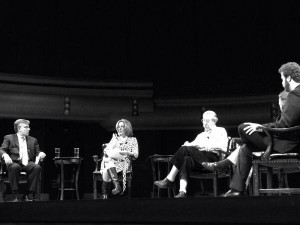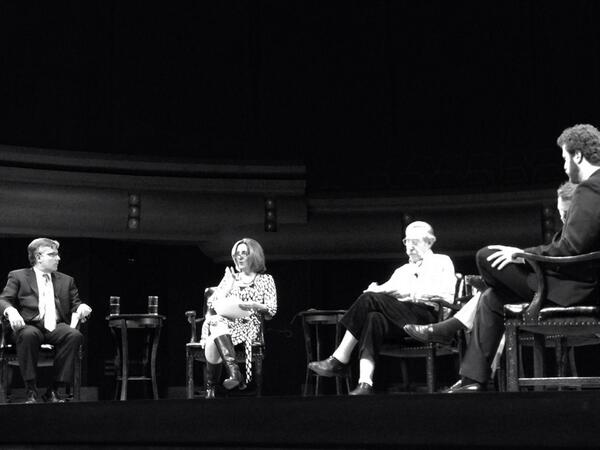The following guest contribution was written by Jonathan Gordon, a junior at the University of Notre Dame with plans of attending law school. The founder of Sports Analytics Blog, Jonathan invites you to connect with him on Twitter and LinkedIn.

Wednesday evening, the University of Notre Dame hosted a panel on the “relationship between academics and athletics.” The panel titled, “For the Love of the Game? Big Time Sports at Big Time Universities”, was moderated by student body president and varsity athlete Alex Coccia.
The most noteworthy speaker on the panel was surely Scott Bearby, general counsel for the NCAA.
Other speakers on the panel included: Patrick Eilers (member of the 1988 national championship Notre Dame football team who went on the play in the NFL and earn an MBA from Northwestern) and Murray Sperber (author of many books on college sports and a professor at Cal Berkeley).
As expected, Bearby spent much of the time defending the NCAA. Sperber frequently criticized the NCAA while Eilers provided a unique perspective as a former student-athlete.
The panel centered around three main discussions – the ideal relationship between athletics and academics, the Northwestern labor case, and the recently changed rules regarding health and nourishment of student-athletes.
What is the ideal relationship between athletics and academics?
Eilers was the only panelist to actually provide a direct answer. The former student-athlete transferred from Yale University after freshman year after the school decided to focus less on football and more on accademics. He wanted a school that strove for excellence in both academics and athletics. To him, the two were not mutually exclusive. Eilers commented that athletics “should enhance, not marginalize, the academic pursuits of university and promote the overall goals of the institution.”
Sperber pointed out that America is the only country with such a collegiate system in place. With student-athletes devoting 40, 50, 60 hours a week to their sports, he questioned if these students “are really getting an education.”
Bearby agreed that some student-athletes may have misplaced priorities, however he suggests for different reasons. “Sports is a competition – to be your best. That may mean misplaced priorities to a soccer player. The player may be less focused on academics, but not because soccer is generating millions of dollars for anyone.”
What are your thoughts on the NLRB ruling that granted Northwestern football players the permission to unionize?
Bearby quickly demonstrated his disapproval of the decision, questioning the reasoning the judge employed.
Sperber, on the other hand, believed that “it was a very good decision in that what [the judge] based his decision on – he goes through the workday. It’s a real workday.” Sperber also pointed out that this ruling only applies to private schools – roughly around 10% of the Division 1-A schools. “The media has been very negligent in calling this an Armageddon against college sports.”
Bearby also commented on the media’s negligence in providing information to the public. “A lot of recent conservation is focused on less than 1 percent of student athletes. That’s what the media wants to focus on. That has skewed public view unfairly to the other 450 thousand [student-athletes].”
Eilers agreed with many of the goals former Northwestern player Kain Colter is working towards. However, Eilers doesn’t believe that a union is necessary to achieve such goals.
What was the line of thinking on the new rules regarding unlimited snacks and meals? Was this directly related to unionization or Shabazz Napier’s comments that he starves some nights?
This question was directly posed at Bearby. Bearby, again, commented on the flaws of the media and emphasized that this was not a direct result of either. “I think that’s where the media misreports and makes links that aren’t there. We don’t move that fast. The issue of meals has been on the agenda for over a year.”
Bearby discussed how this issue was brought up by various student-athlete councils and was something that the NCAA has constantly been working on with student-athletes. Each college has a council of student-athletes that represent all student-athletes from that college. Bearby and Sperber both agreed that some councils are more involved than others. Some council members are voted on by players and truly represent the student-athletes, whereas others are appointed by coaches and represent the coaches’ ideas instead. Bearby commented that the NCAA is looking to better develop the weaker councils. “The NCAA is constantly listening, constantly trying to understand the student-athlete voice.”
The panel provided interesting – often, conflicting – thoughts on the relationship between academics and athletics. If there’s one thing that can be agreed on, it’s that this issue is worth examining and discussing.
